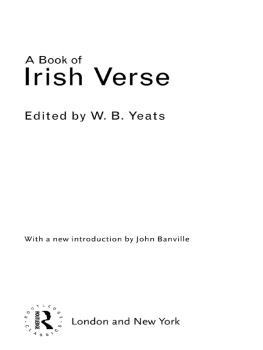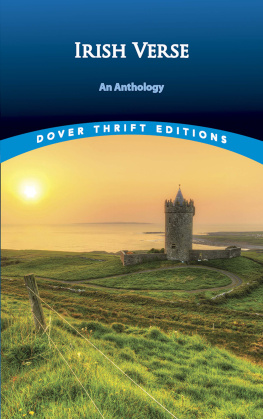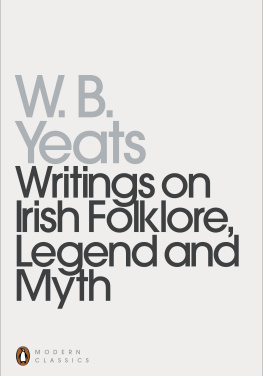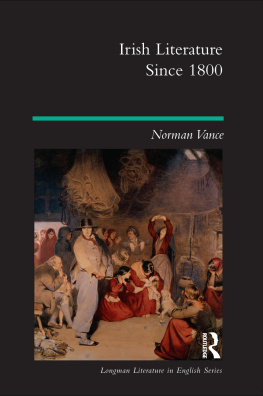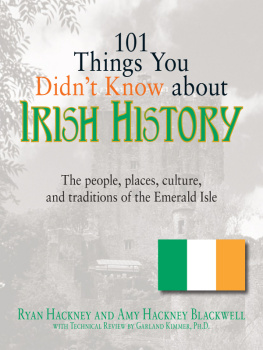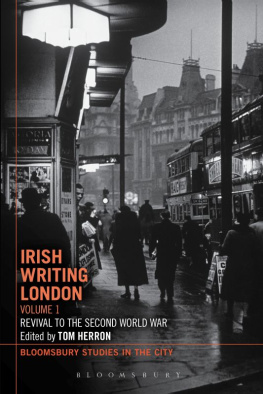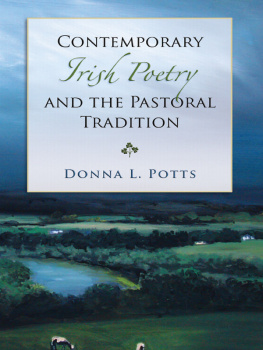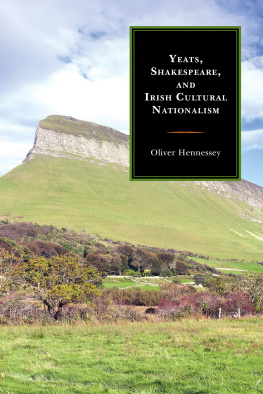Yeats W. B. - A Book of Irish Verse
Here you can read online Yeats W. B. - A Book of Irish Verse full text of the book (entire story) in english for free. Download pdf and epub, get meaning, cover and reviews about this ebook. City: Hoboken;Ireland, year: 2002;2011, publisher: Routledge, genre: Detective and thriller. Description of the work, (preface) as well as reviews are available. Best literature library LitArk.com created for fans of good reading and offers a wide selection of genres:
Romance novel
Science fiction
Adventure
Detective
Science
History
Home and family
Prose
Art
Politics
Computer
Non-fiction
Religion
Business
Children
Humor
Choose a favorite category and find really read worthwhile books. Enjoy immersion in the world of imagination, feel the emotions of the characters or learn something new for yourself, make an fascinating discovery.
- Book:A Book of Irish Verse
- Author:
- Publisher:Routledge
- Genre:
- Year:2002;2011
- City:Hoboken;Ireland
- Rating:5 / 5
- Favourites:Add to favourites
- Your mark:
- 100
- 1
- 2
- 3
- 4
- 5
A Book of Irish Verse: summary, description and annotation
We offer to read an annotation, description, summary or preface (depends on what the author of the book "A Book of Irish Verse" wrote himself). If you haven't found the necessary information about the book — write in the comments, we will try to find it.
A Book of Irish Verse — read online for free the complete book (whole text) full work
Below is the text of the book, divided by pages. System saving the place of the last page read, allows you to conveniently read the book "A Book of Irish Verse" online for free, without having to search again every time where you left off. Put a bookmark, and you can go to the page where you finished reading at any time.
Font size:
Interval:
Bookmark:

Methuen & Co. First published in Routledge Classics 2002
by Routledge
11 New Fetter Lane, London EC4P 4EE
29 West 35th Street, New York, NY 10001 Routledge is an imprint of the Taylor & Francis Group This edition published in the Taylor and Francis e-Library, 2005. To purchase your own copy of this or any of Taylor & Francis or Routledgescollection of thousands of eBooks please go to www.eBookstore.tandf.co.uk. 2002 Michael B.
Yeats Introduction 2002 John Banville All rights reserved. No part of this book may be reprintedor reproduced or utilised in any form or by any electronic,mechanical, or other means, now known or hereafterinvented, including photocopying and recording, or inany information storage or retrieval system, withoutpermission in writing from the publishers. British Library Cataloguing in Publication Data
A catalogue record for this book is available from the British Library Library of Congress Cataloging in Publication Data
A catalog record for this book has been requested ISBN 0-203-99506-6 Master e-book ISBN
ISBN 0-415-28982-3 (hbk)
ISBN 0-415-28983-1 (pbk)
In the 1890s, after the death of Parnell and the politicalvacuum left by that event, Yeats faced the dilemma of decidingwhich kind of Ireland he wished to promote. From early on hehad understood that his poetry would be inextricably linkedwith the destiny of his country. He had spent much of his youthand young manhood in London, and it was there that he had hismost vivid life. Ireland, however, was a constant call to the deephearts core, as he wrote in his early poem, The Lake Isle ofInnisfree, the inspiration for which, according to his Autobiographies,was a glimpse of a miniature fountain in a Londonshop window. When he was in Ireland, the choice was betweenDublins drawing rooms and committee rooms, where the dinof nationalist wrangling could deafen an ear as finely tuned ashis, and the woods and shadowy waters of Sligo, where hispoetic sensibility was most productively at home. Much of theDublin literary world regarded him with suspicion, if notoutright hostility.
Like many another Irish literary exile, Yeats, asR. F. Foster writes in his biography of the poet, was frequentlyportrayed as someone who had managed to fool opinionoutside Ireland, but who would be seen for what he was athome. In the final decade of the century his main critics andopponents were the members of the Young Ireland League, thesurviving rump of the nationalist Young Ireland movementfounded in the 1840s by Thomas Davis, John Blake Dillon andCharles Gavan Duffy. Yeats had wanted to extend the League toLondon and re-found it on strong Fenian principles, but the IrishLeaguers would have none of it. Gavan Duffy, a Catholic and abarrister, had emigrated to Australia in 1856 and in time hadbecome Governor-General of Victoria; in 1881 he returned toIreland, still a nationalist, but of a milder stamp than he had beenin the rebellious 1840s.
A collision was inevitable between theold-guardist Gavan Duffy and Yeats the Protestant champion ofthe new nationalism and patrician advocate of high art. Under the aegis of the National Literary Society, Yeats soughtto publish an influential and, not incidentally, lucrative library ofclassic Irish texts. Gavan Duffy outmanoeuvred him, however,and effectively took over the project. It was the end of whatFoster describes as Yeatss plan to capture the National LiterarySociety and its Library for the Fenian interest, against the safe,all-embracing platitudes located in the middle of the nationalistroad. In the Autobiographies, Yeats took a personal revenge,writing of Gavan Duffy: One imaged his youth in some little gaunt Irish town, where nobuilding or custom is revered for its antiquity, and there speakinga language where no word, even in solitude, is ever spokenslowly and carefully because of emotional implication; and ofhis manhood of practical politics, of the dirty piece of orangepeelin the corner of the stairs as one climbs up to some newspaperoffice; of public meetings where it would be treacherousamid so much geniality to speak or even to think of anythingthat might cause a moments misunderstanding in ones ownparty. No argument of mine was intelligible to him Yeats saw his defeat by this old Young Irelander as, amongother things, the triumph of old-style nationalist banality overtrue literary quality.
He was fierce in his determination to banishthe kind of bombastic versifying that had filled the pages of theYoung Ireland newspaper, the Nation. The Celtic Twilight movement,of which he was the prime mover, was founded on theconviction that a new kind of poetry could be written in Irelandin the English tongue, which would be as authentically Irish asthe work of the great Gaelic bards of antiquity. The readershipthat A Book of Irish Verse was aimed at was the leisured classes whoread little about any country, and nothing about Ireland. We cannot move these classes from an apathy, come from theirseparation from the land they live in, by writing about politicsor about Gaelic, but we may move them by becoming men ofletters and expressing primary emotions and truths in waysappropriate to this country. In his introduction to the book, Yeats mocked the insincere and mechanical verse of the Young Ireland leader, Thomas DavisWhen he sat down to write he had so great a desire to make thepeasantry courageous and powerful that he half believed themalready the finest peasantry upon the earth and even tookcritical swipes at James Clarence Mangan, a poet revered byJames Joyce, but who for Yeats was the slave of life, for he hadnothing of the self-knowledge, the power of selection, the harmonyof mind, which enables the poet to be its master, and tomould the world to a trumpet for his lips. Indeed, throughout his introduction Yeats is surprisinglysevere even on those poets whose verse he has chosen to include.It seems almost that he has chosen them less for the quality oftheir poetry than for the fact that they worked apart from politics.Yet there are very many delights and treasures here, most ofwhich will be unfamiliar to readers of today.
It would be foolishto claim that these pages are replete with great poetry, but whatis exemplary is the determination of its compiler at least tofollow the road of excellence in making his choices. His aim wasto forge out of the English-language tradition in Irish poetry anauthentic literature, one fit for what he was convinced would bea new, autonomous, modern Ireland, even if in his heart he wasfully alert to the ambiguities inherent in that verb, to forge.
JOHN BANVILLE
Font size:
Interval:
Bookmark:
Similar books «A Book of Irish Verse»
Look at similar books to A Book of Irish Verse. We have selected literature similar in name and meaning in the hope of providing readers with more options to find new, interesting, not yet read works.
Discussion, reviews of the book A Book of Irish Verse and just readers' own opinions. Leave your comments, write what you think about the work, its meaning or the main characters. Specify what exactly you liked and what you didn't like, and why you think so.

